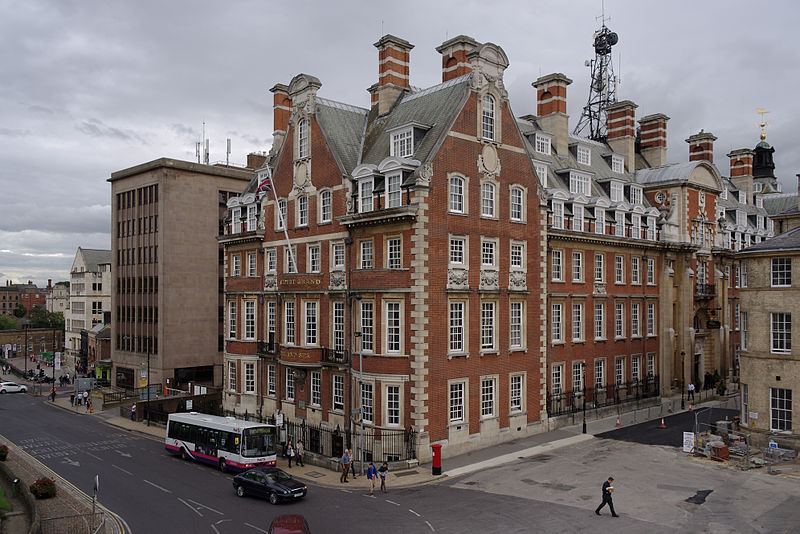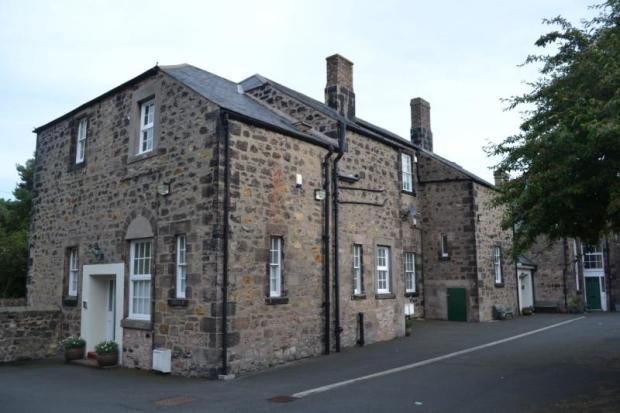HORNCLIFFE MEMORIAL HALL
OPENING CEREMONY
What may be termed as Horncliffe’s completion of her memorial schemes to her fallen sons was the opening of the Memorial Hall on Thursday. Favoured by delightful weather, there was a crowded attendance within the building when Mr Alec. Ritson, Thornton, declared it open in fitting terms.
There still remained a debt of £200 to be cleared off, however, and immediately after a sale of work, for which preparations have been going on for many months, followed. Business was very brisk during the afternoon, which augured well for the effort being successful.
THE OPENING CEREMONY
Capt. F. C. H. Allenby, R. N., presided, and in calling upon Mr Thornton to declare the hut open, made fitting reference to those who had returned after enduring hardships for the sake of those at home. He mentioned that they had collected the sum of £583 to date for the Memorial and the Hut, and he hoped that at the end of the day they would be able to raise the greater part of the £200 to clear off the debt still standing on the building. They could not, he proceeded, have selected one more fitting than Mr Ritson to declare the Hall open. He was always willing to help and serve the community. He much regretted that he suffered from ill-health, but he had served his country to the best of his ability in the War. He knew he felt deeply he was unable to serve in the trenches. He remembered a service friend of his telling him that he wished all men would only do their duty in the sphere they were told off for, and Mr Ritson had always done his duty in his own sphere, rather than call on other people to do it. (Applause).
VISCOUNT GREY AT BERWICK
A LONG AND THOUGHTFUL SPEECH
For some weeks Berwick has been a centre of political interest, on account of Viscount Grey’s return to active politics in support of Mr Walter Runciman in his candidature for the Berwick-upon-Tweed Division, and on Monday night the Corn Exchange was filled with an audience drawn from all classes of opinion in the constituency. The daily and Sunday newspapers have been prophesying that Viscount Grey was to assume the leadership of the Independent Liberals, and again that he was to announce an alliance with Lord Robert Cecil. Neither of these things came off. The meeting was arranged in support of Mr Runciman, and the main thing that came out of Viscount Grey’s speech was that he was in entire sympathy with the Independent Liberals and Mr Runciman. Whether he will be able to remain in the background time will show. There was a large gathering on the platform, and the list we give of those present will also be interesting for its omission of some who have been prominent Liberals in the past, but who are not at the moment “Independents.” In addition to the two prominent speakers there were: – Mr. R. C. Bosanquet, president of the Berwick-upon-Tweed Liberal Association ( in the chair) and Mrs Bosanquet; Mrs Runciman; Sir Walter and Lady Runciman; Mr G. W. Hindmarsh, chairman of the Executive; Ald. T. Wilson. J. P.; Messrs Gerald France, M.P.; Wm. Macdonald, Rock; Rutherford, Seahouses; A. Mitchie, Alnwick; J. Clark, Belford; the Rev. C. L. Stowe, Berwick; D. Elliot, Belford; Mrs Richardson, Berwick; Messrs R. Boston, Spittal; J. Boston, Spittal; Ald. P. Boston, Spittal; W. Nelson, Lowick; J. H. Culley, Kirknewton; T. L. McAndrews, Amble; Miss Boston, Spittal; Messrs F. R. Padley, Wooler; J. Seals, Berwick; A. Younger, Allerdean; Councillor Dudgeon, Berwick; T. Elder, Berwick; Ald. J. Elder, Berwick; Miss Hume, Alnwick; Messrs H. Dowsett, Northern Liberal Federation; D. Elliot, Alnwick; C. Hindmarsh, Alnwick; H. W. Willits, Berwick; J. Cleghorn, Wooler; F. Hindmarsh, Alnwick; J. B. Beveridge, Tweedmouth; T. Morrison, Berwick; J. J. Simmen, Berwick; lady Robson; Miss Gregson, secretary Women’s Liberal Association; Mr W. A. Edwards, secretary Berwick Divisional Liberal Association, and Mrs Edwards; Mr J. Macnab, Beal.

When the party filed onto the platform, amid cheers, there was a pause for a flashlight photograph, and then Mr Bosanquet welcomed Viscount Grey on his return to the constituency from which he had been taken during the war, assuring him that their love and pride and confidence in him were unabated. A rapturous welcome greeted Viscount Grey when he rose. There was a marked improvement in his appearance since he last spoke in Berwick at the War Memorial Meeting. He was more vigorous in his gestures, and had much less difficulty in referring to his notes, which were brief. At one point he was speaking with uplifted arm, and there was another disturbing flash from the camera, which should never have been allowed. We give below a full report of the speech. There was no lack of ability in the Government, he said, but great ability was combined with extreme instability of policy, which had shaken the confidence of people both at home and abroad. We saw it in their treatment of Russia, Mesopotamia, the French Government and the Labour Party, with whom they had played fast and loose over Nationalisation. His most important remarks were on Ireland, and it is a pity that they were not made months ago. We should clear our minds, he said, of sentiment and gush and face the facts of the situation, instead of pretending to be generous after our policy of reprisals had failed. His only reservation to admitting Ireland as a full partner to Dominion partnership was that the naval defence of both islands should be under one naval authority. His last topic was unemployment, and the only permanent remedy in his opinion was good trade. Nationalisation was not the remedy but labour should have its share in the management of industry- an important admission. The speech was well received. There was silence while Lord Grey spoke of nationalisation, loud applause when he said that time had shown the South Africans that in negotiating with them we had been speaking in good faith and that what we had promised had come true. References to Mr Gladstone and Sir Henry Campbell-Bannerman were also cheered. Indeed one felt that at the back of Viscount’s Grey’s mind was the thought of what a difference it would have made if Home Rule had been accepted, as it was first offered by the great leaders he had a served under.
TWEEDMOUTH RATEPAYERS’ MEETING
In the absence of Alderman Elder, Councillor Brewis presided over a large and orderly meeting of Tweedmouth ratepayers in the Mitchell memorial Hall on Wednesday night. Supporting him were Councillor Watt, Mr T. Douglas, Mr D. Watson, Mr Eales, and Mr Bradford. Apologies were sent by Councillor Lockhart and Mr Trainer.
Councillor Brewis, in his opening address, touched on various topics. With regards to the Glasgow Steel Company he thought the non-Freemen were wrong in commencing their activities when the negotiations with the Council were at a critical stage. He thought it was only when the Company saw that the Freemen and non-Freemen could not agree among themselves that they decided to go elsewhere. He could assure any industrial company that wanted to establish themselves in their neighbourhood that Tweedmouth could supply them with a site and equal railway facilities.
The opening of the housing scheme on Monday was a great event for Tweedmouth. The cost to Tweedmouth was a penny in the pound, and the income taxpayers in the country found the rest. They welcomed the new residents. Unfortunately they would not see the whole scheme carried out; in fact, full consent had not yet been obtained for the present addition of twenty-four.






